By David Cory
Whether you’re affected by ectodermal dysplasia first hand or whether you’re a parent, relative or a friend of someone diagnosed with the condition, you certainly understand the challenges and struggles that come with it. While there are symptoms commonly shared by the many types of dysplasia, every ectodermal dysplasia story is different, its own unique journey.
One of the most fulfilling parts of each journey is meeting special characters that come into our lives; the kind of people that tread along the arduous path with us…the ones that lend a helping hand…
…and although some may not stay forever, they undoubtedly leave imprints in our hearts and minds.
Every year, more and more families join the National Foundation for Ectodermal Dysplasias (NFED) community. We continue to grow and become stronger. New mothers and fathers often come to the NFED for guidance, direction and hope. And they receive it!
But, it is most definitely a two-way street. Frankly, as much as we provide support, guidance and hope to families across the globe, we, too, collect so much courage and strength from their stories. Stories of hope, we call them, for they uplift us and inspire us to carry on the good fight.
Recently, a new family reached out to share their story of hope. Though Owen’s path is only just beginning, his family has invited us to stroll upon it, and to maybe leave a foot print or two along the way.
It’s A Small World After All
This particular journey begins with parents, Priscilla and Ryan. Already a mother of two children, Priscilla was well aware of the rigors and risks of childbirth. Not all deliveries are the same. While some run smoothly, others can be very problematic. Fortunately, though, there were no challenges to be had, as baby Owen was delivered quickly and safely.
But it is after Owen’s birth that the true journey begins to unfold. Ectodermal dysplasia is rare and because of that, it can be difficult to get a quick diagnosis. It may take months or years to find a doctor who is familiar with ectodermal dysplasia, let alone the intricacies of the condition. But sometimes, you don’t need a doctor for a diagnosis. Sometimes you just need destiny.
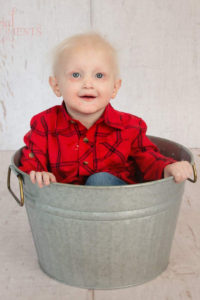
Capeless Hero
Not all heroes wear capes…
…Some just like to wear hospital scrubs.
Following Owen’s birth, the family eagerly awaited answers from the hospital. They spent many days and nights worrying about her son, who refused to take a bottle and whose levels remained elevated.
It must have been the longest week of Priscilla and Ryan’s life. But, it allowed their fate to align with that of nurse Julie who served the newborn intensive care unit where Owen was being treated.
Julie was VERY familiar with ectodermal dysplasias. We might even call her an expert. But her extensive knowledge did not come from many years spent studying in nursing school. Instead, it came from a more reputable source: life experience.
Not only is Julie is a mother of a child affected by ectodermal dysplasia, she is the mother of multiple children affected by the condition; four of her five children, to be exact! Her husband, who also has ectodermal dysplasia, and their four children, all share missing teeth and the very familiar saddle nose.
As Priscilla recalls, nurse Julie was hesitant to come forth with her thoughts about Owen. Perhaps she did not want to incorrectly diagnose him, possibly offending Priscilla and her family. Or, maybe she felt it was simply not her place. Whichever the case, it was when Priscilla decided to speak to another nurse for answers that Julie put aside any fear, stepping forward to address the situation as a professional.
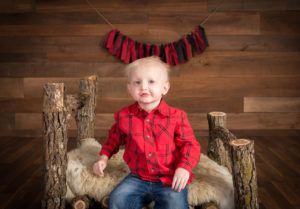
The First Year
The first 365 days of Owen’s was a highly uncertain time, especially since he needed a feeding tube for nutrients. And his poor skin would remain riddled with eczema. Priscilla remembers baby Owen not being able to move without hurting and screaming.
Finally, though, Owen visited with a genetics specialist after three and a half months at the University of Iowa Hospital. Owen’s diagnosis was confirmed by genetics: hypohydrotic ectodermal dysplasia.
Owen relied upon many doctors after leaving the hospital. Priscilla recounts many stressful nights wondering if he would pull through. Naturally, she and her boyfriend worried about job security: would they lose their jobs due to frequent doctor appointments? Do they have enough paid time off?
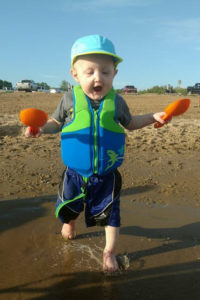
Our Little Monkey
Owen has come a long way since being considered a “failure to thrive”. Though still struggling to gain weight, Priscilla says Owen is making progress little by little. And considering he required newborn-sized clothes for the first couple of months after birth, he is certainly moving forward! Now at age 2, Owen weighs in at approximately 25 pounds.
Currently, Owen does not eat meat. His diet consists of peanut butter and jelly sandwiches, lots of pasta, soft fruit like pears and of course: BANANAS! Priscilla notes that Owen will consume two to three bananas a day!
And like any other monkey, he loves to climb on everything. Owen is a bundle of energy and can be seen jumping and leaping throughout the house. When he’s not in monkey mode (not eating bananas and climbing on everything in sight), you can find him playing with puzzles or his favorite toy cars.
Iowa summers are hot. And like any kid, Owen just wants to have fun. Of course, he does not understand why he must stay inside somedays. To keep Owen cool, they use cold washcloths or take long dips in the swimming pool.
It Takes a Village
Priscilla says ectodermal dysplasia runs in the family. Specifically, she believes it all started with her father’s mother who may have been a carrier for the x-linked condition. And looking at the bigger picture, Priscilla’s father has ectodermal dysplasia. Additionally, her two nephews are affected along with her cousin’s child. There is no better help than those who understand exactly what your child is going through.
Priscilla and her family know there will be more obstacles to navigate as Owen continues to grow. But they are not in this alone. Owen’s primary care physician, for example…
Prior to meeting Owen, she did not have any insight into ectodermal dysplasias. However, through time, she has gotten to know the condition very well. But more importantly, she’s gotten to know Owen as a person.
Priscilla praises her as “beyond amazing,” having done so much for Owen and his family. The bond is so strong that they consider her family.
Priscilla puts it more candidly.
It makes her cry till this day to see Owen how he is. Because he was diagnosed with ‘failure to thrive’, he was a very sick and wouldn’t hold anything down. Now he eats everything! Lol.
Again, Owen is not alone. He has now proudly entered into a new circle, a new family: the NFED.
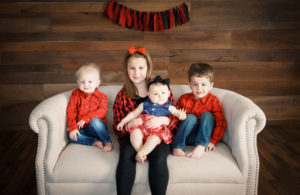
In fact, Priscilla, Owen and his immediate family intend to visit their first NFED Family Conference this year in Chicago. Maybe you’ll also get to meet Owen’s three-year-old brother, Tristan, one-year-old sister, Lily, and the eldest, nine-year-old, Gabriella.
As Owen is now healthy enough to travel, it is the perfect time to meet more children and adults affected with ectodermal dysplasias. They say it takes a village!
One of the most satisfying aspects of an NFED Family Conference is the conversation had between fellow parents. Owen may be too young to remember much from the first conference, but the value to parents both young and old is priceless. It’s a wonderful time to ask the tough questions and to dig for buried answers. Or it may simply be time to tell a complete stranger a funny ectodermal dysplasia-related story!
Keep Fightin’
Priscilla puts it well.
Owen is our fighter and proves time and time again that he will beat anything that stands in his way.
We all understand ectodermal dysplasia’s path might be more arduous than most, but with the right people in your corner, anything is possible. A major concern that Priscilla shares with the entire NFED community is the battle for teeth.
Julie, the nurse that helped informally diagnose Owen, mentioned to Priscilla that she spent much time battling with her health insurance company. As many families have reported, these same companies continue to deny requests for dental treatment such as dentures and dental implants.
Priscilla is now understanding this more and more. It may not be an easy fight that lies ahead for Owen. But it’s one that is necessary to confront.
Owen’s path may by challenging. But he has a wonderful family that will enable him to conquer any obstacle. He also acquired the love and support of the NFED family. Keep fighting, Owen. We all walk beside you along the road less traveled.
David Cory is a volunteer writer for the NFED. He’s a social worker who grew up with the Foundation and lives in New York. You can read about him here.
Share Your Story
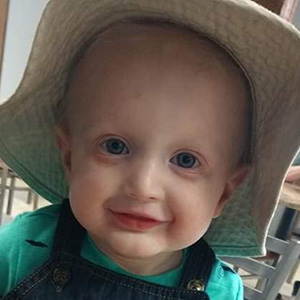
I am so proud to call this booger my nephew! My two sons 5 years and 7 months old are affected by this condition and it’s a tough road! Carter was a eater despite anything. But Liam on the other hand, has been told he’s a failure to thrive due to wait gain and feeding issues and is on the NG tube until his GTube can be placed. Forever proud of these kids and adults affected. ❤️
We understand your challenges. Failure to thrive is a common challenge for families with HED. Have you registered with us at https://nfed.org/join-us/? We have lots of information and programs to help you. Here’s an article about growth issues that you may find useful: https://nfed.org/blog/growth-and-nutrition-for-children-with-ectodermal-dysplasias/. If we can help you in any way, don’t hesitate to call us at 618-566-2020 or email us at info@nfed.org. We are here to help. Jodi, NFED, Director, Marketing and Communication
My granddaughter has this condition, she is 18 years old, is brilliant, beautiful, and has a sweet, and loving personality….. we are so blessed to have her as part of our lives…
We love to hear this! Thank you for sharing about her. Jodi, NFED, Director, Marketing and Communications
My 2 boys with HED both had feeding tubes for the first 5 years due to aspiration, and failure to thrive. It is amazing how many have feeding problems. Now 8 and 9 they are strong boys with huge appetites!
That’s amazing! I’m so glad we can all connect with different stories of our children! 💜💜
Hi, Linda. You are right that it’s common for those with HED to have feeding issues and be labeled failure to thrive. We conducted a research study which documented the growth issues in HED. The good news is that while they have the issues early in life, once they hit puberty, the catch up on their growth. Glad to hear that yours sound like they are doing well! ~ Jodi, NFED, Director, Marketing and Communications
You’re so right MJ! They are very loving and are super smart! 💜
Kudos to the staff member who put this together. It is a great story. I have to admit I wasn’t certain if I’d make this year’s conference but after reading this I’d love to meet this little guy and his family. I’m so glad the family has found the NFED as it likes finding one’s home.
Thank you, Mary K., for the kind words and you know we ALWAYS want to have you at the Family Conference. While I organized the story, all the credit goes to volunteer, David Cory, for interviewing the family and writing their story. Of course, the real kudos goes to the family for coming forward to share their story! ~ Jodi, NFED, Director, Marketing and Communications
Mary we would love to meet you as well!
Love this family and their story ❤️
So do we! – Jodi, NFED, Director, Marketing and Communications